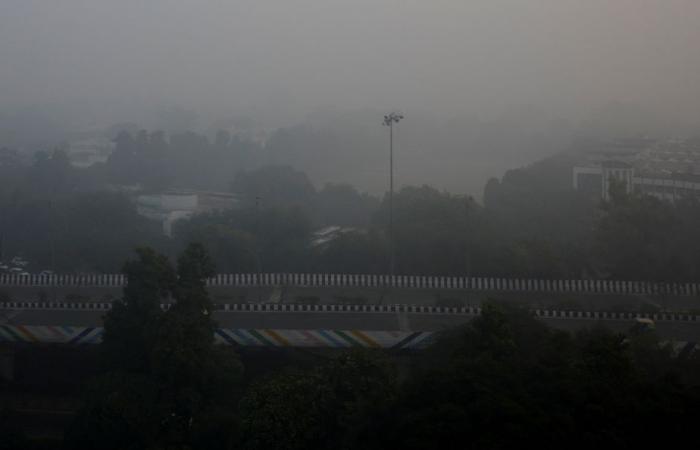(New Delhi) Air pollution reached a new worrying peak on Monday in the Indian capital New Delhi, drowned in a fog as opaque as it was toxic which forced the authorities to close most schools.
Updated at 7:34 a.m.
Bhuvan Bagga
Agence France-Presse
Air concentrations of PM 2.5 microparticles reached levels there in the morning up to 60 times higher than the thresholds recommended by the World Health Organization (WHO), according to readings from the company IQAir.
The megalopolis of 30 million inhabitants is confronted every winter with episodes of hyperpollution caused by the usual fumes from factories and road traffic, to which are added those from seasonal agricultural burning.
This toxic lid largely spilled over from New Delhi on Monday to cover a large part of northern India. Visitors to the Taj Mahal in Agra have flooded social media with photos of the famous white marble monument shrouded in mist.
After a short respite, residents of neighboring Pakistan’s second city, Lahore, once again breathed air described as “dangerous” on Monday.
“Smog” is judged by experts to be responsible for thousands of premature deaths each year.
“My eyes have been burning for several days,” Subodh Kumar, 30, who drives a pedal taxi (rickshaw), told AFP. “But, pollution or not, I have to be on the road,” he added, “my life […] is outside.
“I have never seen this in the forty years that I have lived here,” Scottish historian William Dalrymple testified on his X account, comparing the Indian capital to a “death trap”.
Local authorities triggered level 4 of their alert plan on Sunday evening “in order to prevent further deterioration of air quality”.
“Education affected”
“Face-to-face classes will be interrupted for all students except levels 10 and 12” at high school, ordered the head of the local executive, Atishi, who only goes by one name.
Primary schools were closed last week.
“Children’s education will be affected because not everyone will be able to follow online courses,” lamented Monday a mother, Huma Naaz, whose son goes to school in New Delhi.
All construction sites have also been suspended and the movement of heavy goods vehicles and the most polluting vehicles has been severely restricted.
The local government also urged children, the elderly and all those suffering from lung and/or heart conditions to “stay indoors as much as possible”.
Many residents of the Indian capital cannot afford air purifiers and live in homes with little insulation from the outside.
“Who can afford an air purifier when they have trouble paying their bills? “, argued Rinku Kumar, 45, a driver of “tuk-tuk”, these motorized three-wheeled taxis.
“Rich ministers and senior civil servants can afford to stay at home, ordinary people like us cannot,” he added.
According to the WHO, air pollution can cause cardiovascular or respiratory diseases and lung cancer.
“The government does nothing”
A study published in the medical journal Lancet blamed poor air quality for the deaths of 1.67 million Indians in 2019.
India’s Supreme Court on Monday ordered authorities to take “all possible measures” against pollution, arguing that it is their “constitutional obligation” to “ensure that citizens live in a healthy atmosphere”.
The preventive measures implemented so far by the authorities, both national and local, have so far proven to be largely ineffective.
The “chief minister” of New Delhi once again questioned on Monday the agricultural burning carried out in the states neighboring the capital.
“The national government is doing nothing. Today all of North India finds itself in a situation of medical emergency,” lamented Atishi, from the opposition to Prime Minister Narendra Modi.
“All night long I received phone calls from people who had to hospitalize elderly people for respiratory problems,” she lamented to the press.
After encouraging motorists to turn off their engines at red lights, the municipality of New Delhi tested a filtering tower in 2021, which was quickly abandoned, and is now considering using drones to water the most polluted areas.
“Measures”, denounce the environmental defense NGOs, who advocate “stopping emissions at their base”.






